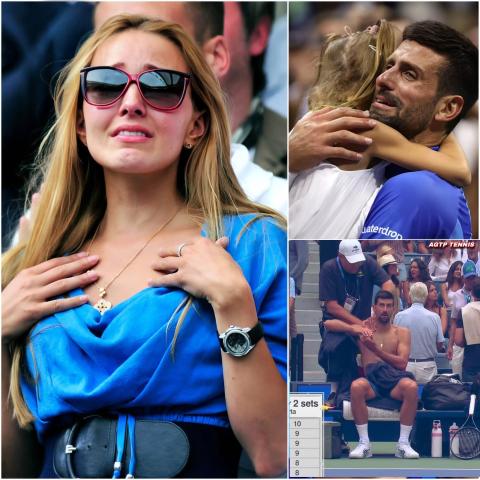
The roar of the crowd is a symphony he conducts with his racket. The sweat on his brow glistens under the stadium lights, a testament to a battle fought not just against the opponent across the net, but against the ghosts that haunt his own mind. Novak Djokovic, the player with 24 Grand Slam titles, the man etched into history as one of the greatest athletes of all time, looks invincible.
But at home, in the quiet moments away from the adoring masses and the flashing cameras, a different truth unfolds. It is a truth his wife, Jelena, knows all too well—a truth she carries with a heart both heavy with worry and swollen with pride.
In a rare, unguarded moment, the strong facade of the champion’s wife crumbled. “My husband, he’s scared,” Jelena Djokovic shared, her voice trembling, tears welling in eyes that have seen both his deepest triumphs and his most private struggles. She revealed the haunting reason behind the immense pressure that seems to radiate from him on court: a major past trauma has cast a long shadow over his career, causing Novak to live in a state of constant worry and panic, forever feeling tense and guarded the moment he steps onto the court.
This is not the fear of losing a point or a match. This is a deeper, more primal fear—a relic from a past he seldom speaks of. Those who know his story recall the childhood spent in a Belgrade battered by bombs and economic collapse, practicing in an empty swimming pool as air raid sirens wailed. They remember the immense, suffocating pressure he shouldered from a young age, not just to win, but to become the sole provider for his family, to lift them out of hardship through the sheer force of his talent. Every match was not a game; it was a lifeline.
For Jelena, this history is not a footnote; it is the key to understanding the man she loves. “People see the fist pumps, the roar, the intensity,” she explains, her words measured yet aching with emotion. “They call it arrogance, they call it a thirst for victory. And it is, partly. But what they don’t see is the foundation of that intensity. It’s fear. It’s the memory of what it felt like to have nothing. It’s the terrifying thought that it could all be taken away in an instant.”
Her critical role is one of an emotional anchor in a perpetual storm. Her emotional status is a complex tapestry:
1. The Protector: Jelena exists in a state of hyper-vigilance. She is the guardian of his peace, fiercely shielding him from external negativity and creating a sanctuary of unconditional love and normalcy with their children. She is the buffer between the world’s demands and the man who feels them too deeply.
2. The Interpreter: She alone translates the world’s perception of Novak’s on-court tension into its painful reality. Where fans see a player arguing with his box, she sees a man desperately seeking a familiar anchor in a sea of anxiety. Where critics see gamesmanship, she sees the manifestation of a deep-seated panic, a need to control every variable in an uncontrollable environment.
3. The Heartbroken Witness: There is a profound sorrow in watching someone you love endure silent suffering. “It is heartbreaking,” she confesses, “to see him before a final, to feel the tension rolling off him. He is not thinking about the trophy; he is wrestling with demons. He is back in that empty pool, fighting for his family’s survival all over again.” Her tears are not of weakness, but of empathy—a shared burden of a pain she cannot fully take away.
4. The Fierce Admirer: Amidst the worry, there is an unshakeable awe. Her fear is intertwined with a breathtaking respect for his courage. “The most incredible thing,” she says, her voice strengthening, “is that he steps out there anyway. Every single time. With that fear sitting on his chest, he walks onto that court and he fights. He uses it. He transforms that panic into the most breathtaking focus the sport has ever seen.”
This is the ultimate drama of Novak Djokovic. His greatest match is not against Nadal, Federer, or Sinner. It is against himself. Every serve is a confrontation with anxiety. Every championship point is a exorcism of a ghost from his past.
And in the player’s box, Jelena Djokovic watches, her heart in her throat, living every point with him. She is not just the wife of a champion. She is the witness to a daily, Herculean act of courage—the story of a boy who was once scared in the dark, who grew into a man who chooses to conquer his darkness under the brightest lights in the world. The crown of greatness is not made of gold, but of scars, and no one knows its weight quite like the queen who stands beside the king.
